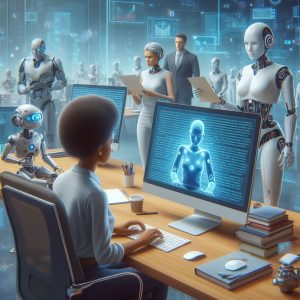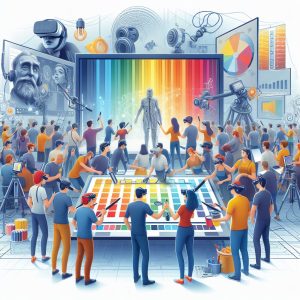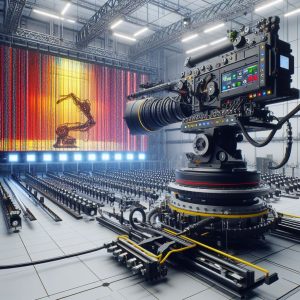In the realm of cinematic storytelling, where the magic of performances and narratives converge, the integration of Artificial Intelligence (AI) has begun to reshape the landscape of movie making. While AI’s presence in the industry isn’t entirely new, its recent advancements have opened up unprecedented opportunities for filmmakers and actors alike.
AI’s Role in Acting: A New Frontier
AI-powered acting is not about replacing human actors; rather, it’s about empowering them with innovative tools and techniques that enhance their craft. Here are some ways AI is transforming the acting landscape:
- Emotion Recognition and Analysis:
AI algorithms can analyze facial expressions, body language, and speech patterns to provide actors with real-time feedback on their performances. This enables them to fine-tune their emotional expressions and deliver nuanced performances.
- Virtual Coaching and Training:
AI-driven virtual coaches can provide actors with personalized training and guidance. These coaches can simulate various scenarios, helping actors prepare for specific roles and emotions.
- AI-Generated Dialogue:
AI can generate natural and contextually relevant dialogue based on a given script. This technology can assist actors in developing their lines and exploring different interpretations of their characters.
Unveiling New Storytelling Possibilities
Beyond enhancing individual performances, AI-empowered acting unlocks new storytelling possibilities for filmmakers:
- Creating Hybrid Characters:
AI can create hybrid characters that seamlessly blend human and virtual elements. These characters can possess unique abilities or appearances, expanding the range of storytelling options.
- Real-Time Performance Capture and Animation:
AI-powered performance capture systems can track actors’ movements and expressions in real time, enabling the creation of realistic digital avatars. These avatars can be used in both live-action and animated films.
- Emotionally Intelligent Storytelling:
AI can analyze audience responses to various scenes and characters, providing filmmakers with insights into the emotional impact of their storytelling. This data can guide them in crafting more emotionally resonant narratives.
Ethical Considerations and the Human Touch
While AI-empowered acting offers exciting possibilities, it also raises ethical considerations. It’s crucial to ensure that AI is used as a tool to augment human creativity, not as a replacement. The authenticity and emotional depth that human actors bring to their roles remain irreplaceable.
Ultimately, the integration of AI in acting is not about diminishing the human element but about expanding the boundaries of storytelling and creating immersive experiences that captivate audiences in new and unforgettable ways. As AI continues to evolve, the future of movie making promises to be a dynamic and thrilling journey.
Navigating the Changing Landscape of Acting: Dangers, Possibilities, and Adaptation
The cinema industry is undergoing a revolutionary transformation with the advent of artificial intelligence (AI). While AI poses certain dangers to the acting profession, it also presents exciting possibilities and opportunities. In this blog, we explore the potential risks and rewards of AI’s integration into the film industry, examining how actors can adapt to this changing landscape.
- Dangers of AI for Actors:
a. Job Displacement: AI technology has the potential to replace actors in certain roles, leading to job loss and decreased opportunities.
b. Diminished Creativity: AI may limit actors’ creative expression by creating formulaic performances that lack authenticity and emotional depth.
c. Emotional Detachment: AI characters may lack the ability to evoke the same emotional connection and engagement as human actors. - Possibilities of AI in Acting:
a. Enhanced Performances: AI can assist actors in refining their performances by providing real-time feedback and suggestions for improvement.
b. New Storytelling Opportunities: AI can enable the creation of new and innovative storytelling techniques that were previously impossible with human actors.
c. Accessibility and Inclusivity: AI can improve accessibility and inclusivity in the film industry by providing opportunities for actors who might face physical or social barriers. - How AI will be Used to Help Actors:
a. Virtual Auditions: AI can facilitate virtual auditions, allowing actors to showcase their talent regardless of location or time constraints.
b. Performance Analysis: AI can analyze actors’ performances and provide detailed feedback on their strengths and areas for improvement.
c. Personalized Training: AI-driven programs can offer personalized training tailored to each actor’s unique needs and goals. - Adapting to the Changing Landscape:
a. Embrace Technology: Actors should embrace AI technology and view it as a tool to enhance their craft rather than a threat.
b. Develop New Skills: Actors should focus on developing new skills such as digital acting, motion capture techniques, and voice acting to stay relevant in the evolving industry.
c. Collaborate with AI: Actors should seek opportunities to collaborate with AI in creative ways that leverage technology’s strengths while preserving the authenticity of human performances.
Conclusion:
The integration of AI in the cinema industry presents both challenges and opportunities for actors. While AI may pose certain risks to the acting profession, it also holds the potential to revolutionize storytelling and open up new avenues for creative expression. Actors who embrace technology, adapt to the changing landscape, and find ways to collaborate with AI will be best positioned to succeed in the evolving film industry.



